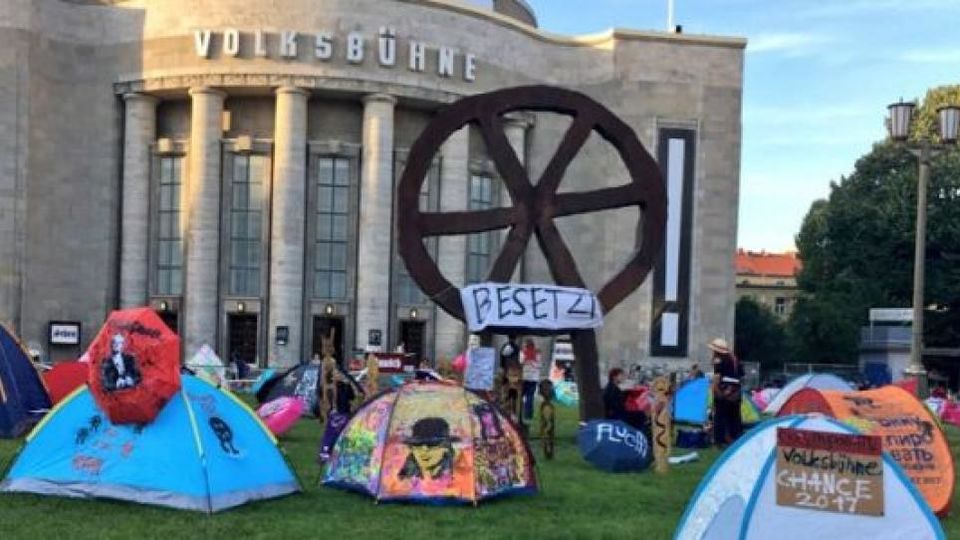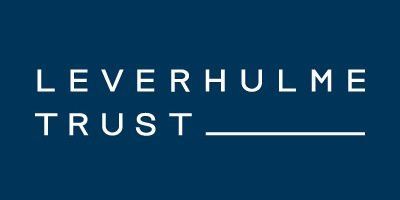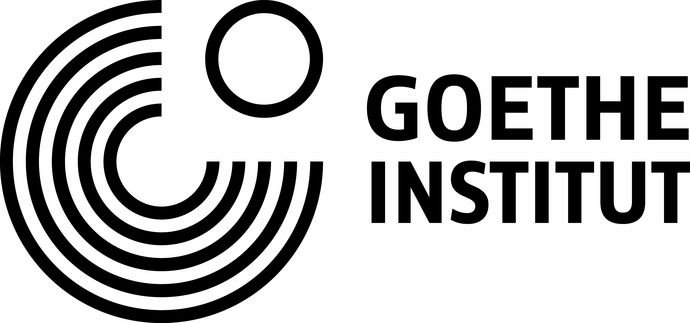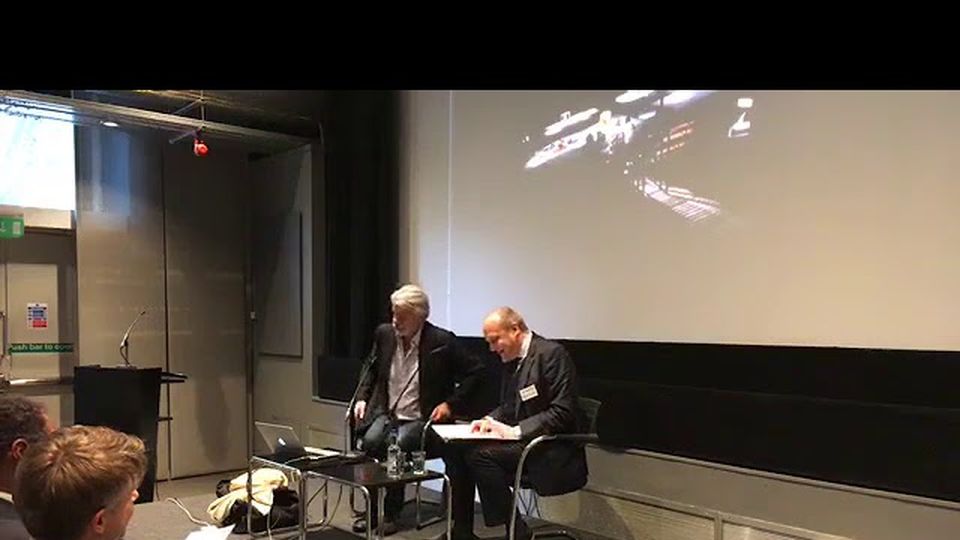Central's Professor of European Theatre Discusses Theatre In Crisis with Chris Dercon

Central’s Professor of European Theatre, Professor Peter Boenisch, recently appeared in conversation with former Artistic Director of Berlin Volksbühne theatre, Chris Dercon at international conference Systemic Crisis in European Theatre.
The discussion between Professor Boenisch and Chris Dercon was one of the highlights of the conference, held by Central in collaboration with the Goethe Institute, London and with support from the Leverhulme Trust. The conference took place on Friday 27th and Saturday 28th April, 2018, and was the culmination of Central’s visiting Leverhulme Professorship with Professor Chris Balme. For 255 days, from September 2017 to Thursday 12th April 2018, Chris Dercon was Intendant (Artistic Director) of the Berlin Volksbühne theatre. This talk, which you can watch below, was Dercon’s first public appearance since his dismissal two weeks prior.
Watch the full discussion
About this discussion
Dercon’s plenary conversation with Professor Boenisch did not try to offer juicy behind the scenes anecdotes or get entangled in blame-gaming, but sought to offer some reflections, visions, analysis and positions on aspects and dimensions of this ‘systemic crisis’ – not only but primarily of the German institutionalised system of state funded theatre – from someone who had entered this system from the outside, only to be churned out again with a vengeance.
Background
Three years ago in April 2015, the then Berlin Secretary of Culture, Tim Renner, had presented Chris Dercon as successor of Frank Castorf, who had led the Volksbühne as Intendant since 1992. This decision had been secretly and single-handedly prepared by social-democrat Renner and his fellow party member, still-Berlin mayor Michael Müller. It was extremely controversially received from the start.
Following a local election, Renner was replaced by Klaus Lederer from the Left party (Die Linke) as new Culture Secretary. Lederer had already joined the occupation of the Volksbühne by Dercon’s opponents and now handed Dercon his resignation. From the beginning, this affair that eventually had turned into an outright culture war that broke old friendships and at times ended up in physical attacks, was never about aesthetics.
In 2015, following his appointment, Dercon himself explained the controversy in an interview with Süddeutsche Zeitung newspaper:
“The rage has less to do with my person than with the situation of theatre today, and its future. Of course, German theatre is very important, but the audience, the public has changed. Berlin today is a cosmopolitan city, and to come to terms with this fact, is not easy for German theatre.”
Dercon here already pointed to central issues of this crisis, some of which were very local, associated with the unique and specific history of Berlin: the divided city, which after German unification in 1989 had experienced a cultural and economic boom. Living was cheap here, so the city attracted both a left, bohemian clique and equally a generation of founders and creatives with their start-up companies.
As German cultural studies scholar Diedrich Diederichsen perceptively noted, Frank Castorf’s Volksbühne had for a long time managed to attract both of these new, but very different counter-cultures.
More recently, and in particular since the fallout of the 2008 financial crisis, a deep split has gone through Berlin, separating and opposing these two groups. More and more tourists arrived on more and more low budget flights; more and more creatives from abroad moved to Berlin, who did not at all gel with the local, post-punk alternative “freie Szene”. Within Berlin, which today continues to grow by up to 50,000 new inhabitants every single year, more and more cheap, derelict apartments were modernised, privatised, many rented out as Air B&B apartments, others bought by new international owners. The public infrastructure has become more and more stretched. Gentrification hit, in particular, the area around the Volksbühne at Rosa-Luxemburg-Platz, the district of Prenzlauer Berg – formerly the cheap, alternative, derelict squatter district of the 1990s (let alone the late GDR) that was symbolised by Castorf’s Volksbühne which had demonstratively put the letters “OST” (East) on its roof. Within only few years it had become one of the city’s most gentrified and most expensive districts, with flats selling for more than one million Euros.
The recent theatre war about the Volksbühne and Chris Dercon has therefore also been a war about the effect of globalization on a city and its people (not so much original Berliners, but those who had moved here in the 1990s) – and this effect has not only been a split between those who have been here and those who move here, but a split that in particular broke the critical left into various camps, who now also battled over the Volksbühne.
As Diederichsen continued to note, a matrix has been constructed where Castorf and Pollesch stood in line with Sarah Wagenknecht, the iconographic leader of the German left party on the one side (Diederichsen speaks of the ‘rather un-feminist, east-socialist, anti-american Brecht- and Mueller-heirs), while on the other side the so-called ‘political correctness’ of queer studies and postcolonialism were equalled with neoliberal globalisation, and few distinctions made between tourists, new inhabitants and refugees. As a result, the extreme fervour with which the debate about Dercon’s appointment had been led, the hostility and sabotage of his tenure, showed frightening resonances with both the rhetoric, the irate agitation, and the at times physical violence of the new nationalist right. The debate was almost entirely led beyond the rational exchange of arguments and deliberation idealised by Jürgen Habermas, but reflected a new mood entirely predicated on a postfactual streaming of emotions, affect, ressentiment, and simple explanations, which sociologist Heinz Bude has perceptively analysed in his work: on the one hand, the good, simple people, the Volk and the Volksbühne, on the other side the invaders, the elite, the traitors.
Against this background, the conversation opened with the one question which the new Volksbühne had asked to answer, on their website, all the artists who had worked there during Dercon’s short tenure – from young German director Suzanne Kennedy to film enfant terrible Albert Serra, Thai filmmaker and artist Apichatpong Weerasethakul, and – for Dercon’s final premiere, a coproduction with the Manchester International Festival – Berlin-based Israeli multi-media artist Yael Bartana. The artists were all invited to answer the same question: What can the 2,500 year old ritual of theatre bring about right now, at this specific moment in time?
Biographical notes
Chris Dercon is from Belgium. Following his studies, at Leiden and Amsterdam, of art history, theatre studies and film theory, he worked worked as freelance art critic for Belgian radio and TV, and he taught video and cinema at the Hooge Instituut voor Beldende Kunsten in Brussels. After he worked as producer and director for the legendary theatre and dance festival Klapstuk in Leuven, where he began to programme and curate dance, visual art, and performance, he was appointed to head the MOMA-affiliate Institute of Contemporary Art P.S.1 in New York in 1988, before becoming director of the Witte de With centre for contemporary art in Rotterdam in 1990, and director of the Museum Boijmans Van Beuningen, also in Rotterdam, from 1996. From 2003 to 2011, he was director of the Haus der Kunst at Munich, where he installed a theatre stage at the venue in cooperation with Bayerisches Staatsschauspiel. From 2011 until his appointment to Berlin, he was director of Tate Modern, where – with architects Herzog & De Meuron – he transformed the ‘tanks’ as exhibition spaces for ‘art in action’, and presented work by Tino Seghal, Boris Charmatz, Jerome Bel, Anne Teresa de Keersmaeker, and Tim Etchells, all of whom he had recently also programmed at Volksbühne.
Peter M Boenisch is originally from Munich and lives in Berlin and London. He is Professor of European Theatre at the Royal Central School of Speech and Drama, University of London, and Co-Director of the European Theatre Research Network (ETRN). He previously worked at the University of Kent and Ludwig-Maximilians-Universität München.



